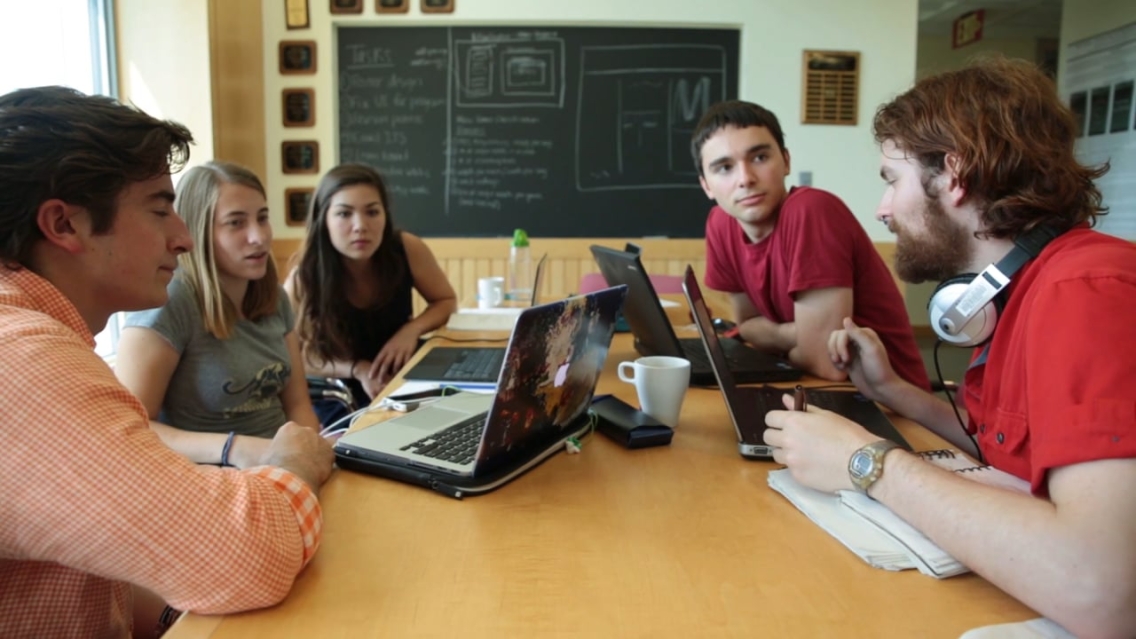Students Invent a Muse in a Machine [video]
MIDDLEBURY, Vt. – Can a computer program actually create meaningful song lyrics? A team of students set out to explore this question last summer during an eight-week summer research project focused on the field of computational linguistics. The result of their study, which was supported by the College’s Fund for Innovation, is “PopMuse,” a song lyric generator designed to offer useful ideas to aspiring songwriters.
Online lyric generators are actually quite common, according to Florence Feiereisen, associate professor of German and one of two faculty advisors along with mathematics professor Frank Swenton. However, many of those programs are created for the amusement of users, she says. If you read through the lyrics, they can seem random or just copy-and-pasted from existing songs.
“Our students wanted to create a better song lyrics generation system that took into consideration all levels of linguistics, including phonetics, morphology, syntax, and semantics,” said Feiereisen.
“After looking into similar lyrics generators on the Internet, we discovered that many were actually quite poor at performing their one function,” said Stefan Pla, a junior German and economics major. “This was exciting; we took it as a challenge to create a more comprehensive and detailed system.”
Sophomore Maya Reich, the lone computer science major in the group, agreed. “When we were brainstorming ideas for our project, we wanted to choose something that was unique, creative and potentially useful for others,” she said. “At the same time, we wanted to choose a project that had been done by others before so that we could compare our results with theirs and improve upon previous attempts.”
PopMuse begins with a short series of prompts to help define the song’s style. Users pick a sentiment – Love is complicated, Love is a party, Love is sexual, and so on. Then they choose a decade from the 80’s forward and decide how many clichés they can tolerate (an option Feiereisen calls the “cheese-o-meter”). From there, PopMuse creates a multi-verse song, including a chorus.
An important distinction between PopMuse and other lyric generators, says Feiereisen, is that, after producing a song, it gives the human user the option to revise those words by regenerating a line or by manually editing the text. “This way, the computer gives the agency back into the human’s hand,” said Feiereisen. “Think of it as an artistic sculpture: PopMuse generates a rough outline and the artist chisels until the piece of art is done!”
The human-computer balance was important to the project said Feiereisen. PopMuse was never intended to be a replacement for human creativity, but rather to assist in the creative process, which is an idea “deeply rooted in the digital liberal arts.”
The five students working on the project came from varied academic backgrounds – two biology majors, computer science, German, and English – but all had taken at least a few linguistics classes. The computer programming was new to most of them.
“The hardest part was probably learning to code in C++,” said Bryce Williamson, a junior majoring in biology and minoring in French. “None of us had used it before and it is fairly close to the machine level, so it involved learning a number of new concepts as well as some complicated syntax.”
Kali McGown, a senior biology major, had taken classes in both linguistics and computer science prior to the PopMuse project and was glad for a chance to merge the two fields of study. “Not only did I get to go into greater depth into the combined area of computational linguistics, but I was also able to help create a tangible product that brought everything together,” she said.
PopMuse is still a work in progress, and the students may not have clear answers to questions about computers generating meaningful lyrics. But they all agree that it was a great learning experience–both for honing hard skills such as coding and broader ideas about group collaboration on common goals. The team is now working on a paper about their project and hopes to make the program available online to the general public in the near future.
About the Fund for Innovation
The Ron and Jessica Liebowitz Fund for Innovation (FFI) supports projects that promote a culture of creative thinking at Middlebury. FFI seeks proposals for experimental ideas and projects that have the potential to create lasting, positive change for the Middlebury community.
Reporting by Stephen Diehl

